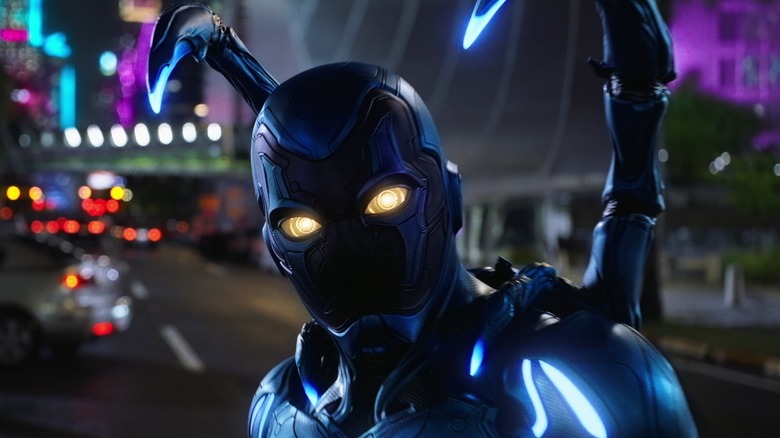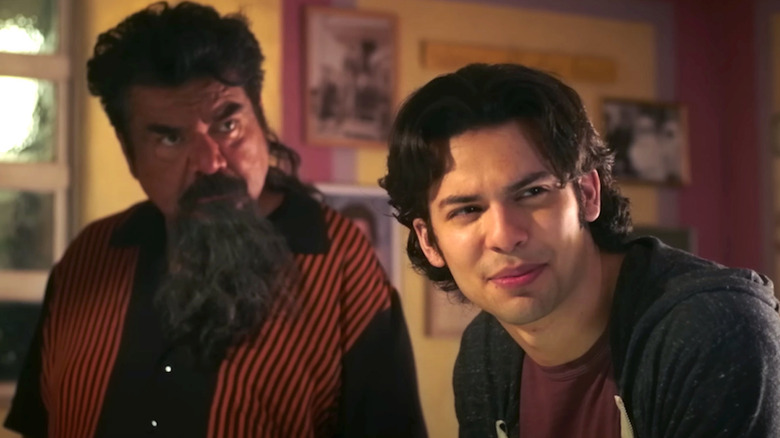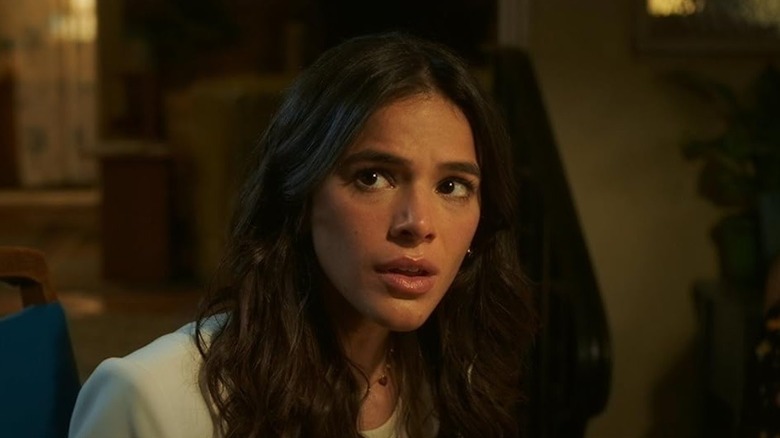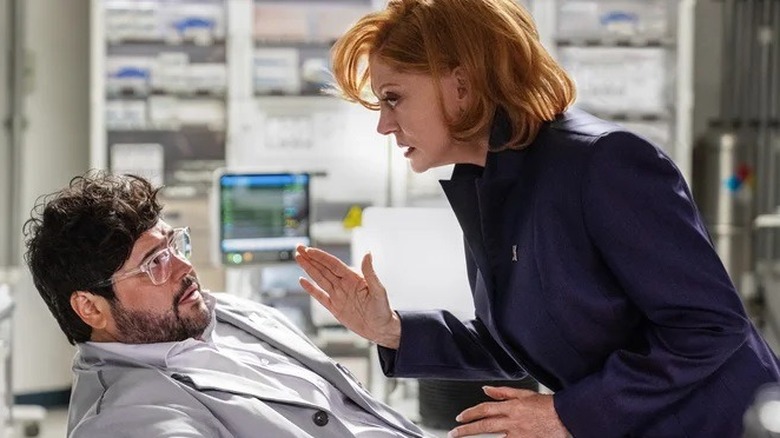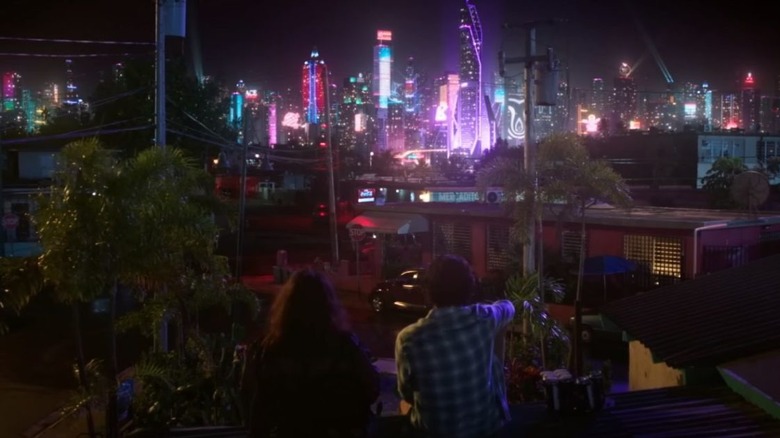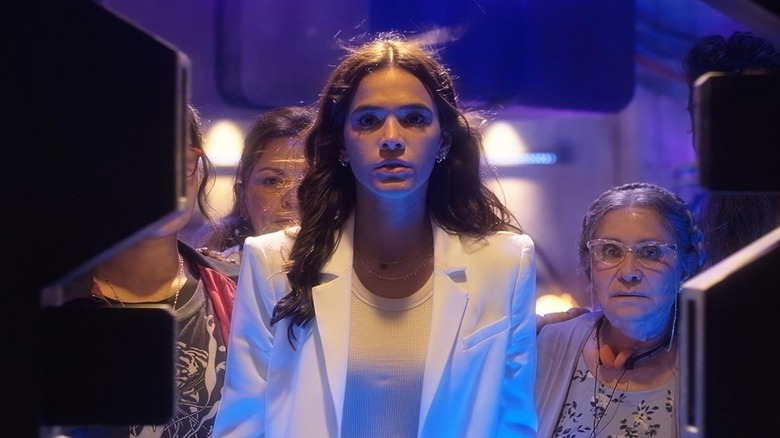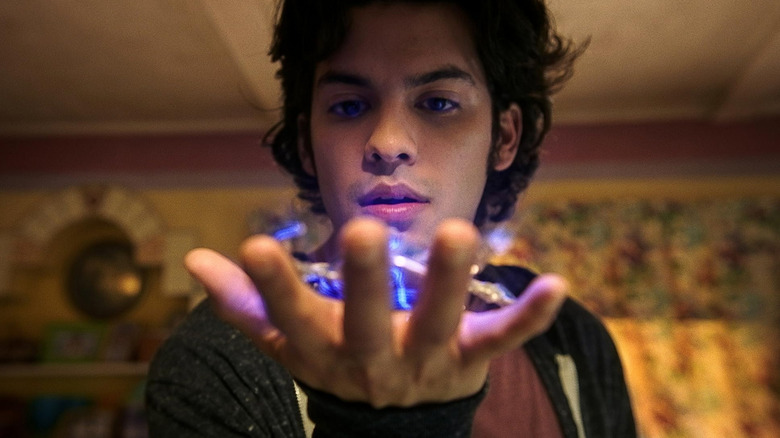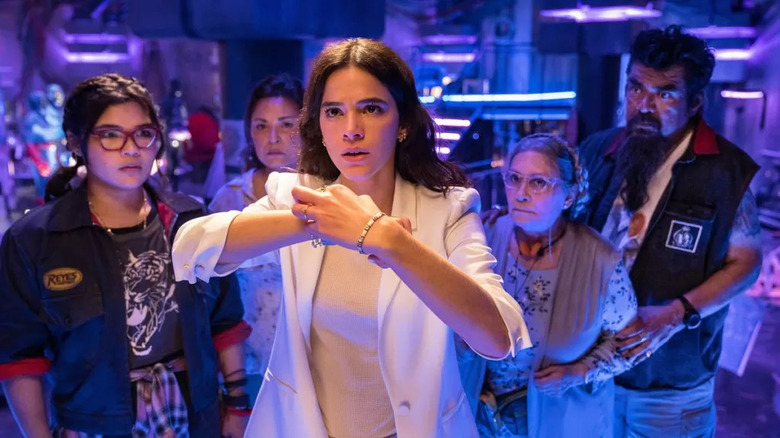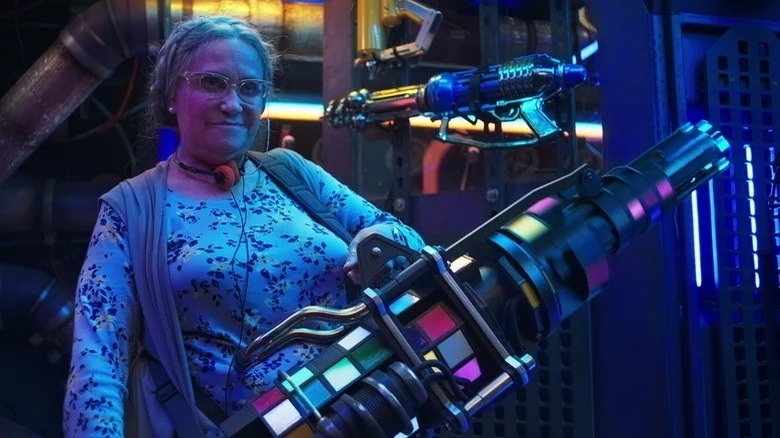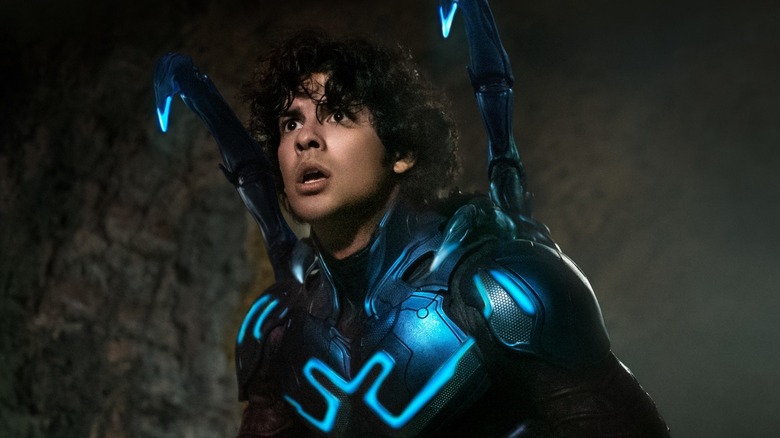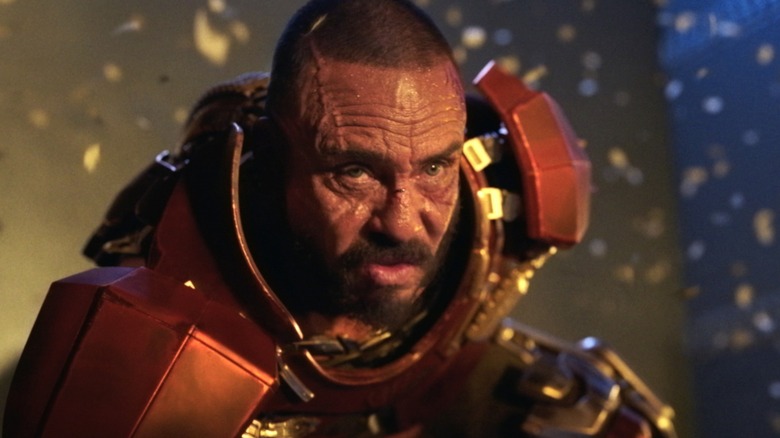Dumb Things Everyone Ignores In Blue Beetle
Contains spoilers for "Blue Beetle"
Just like its titular character, "Blue Beetle" is an underdog of a movie put in an impossible situation that nevertheless held its own in the first weekend of its release. That is, if you can call a $25 million haul holding its own. Technically, Warner Bros. bested itself with its latest comic book adaptation. "Blue Beetle" unseated "Barbie" from the cinematic throne it held onto for a month, but it's possible the film won't even recoup its estimated $104 million budget.
Sandwiched between the much-hyped but ultimately disappointing "The Flash" and the long-delayed sequel "Aquaman and the Lost Kingdom," and with the DCEU limping to its confused conclusion as the James Gunn era begins, this late-to-the-game origin story feels like it never had a chance. That's a shame, because it's one of the best reviewed movies in the franchise and it has a lot of good things going for it.
Anchored by a winning performance by Xolo Maridueña of "Cobra Kai" fame and with an enthusiastic ensemble cast, "Blue Beetle" is a fun and stylish romp that manages to make audiences care about its brand new characters. There's a lot going on in Palmera City, at Kord Industries, and at the home of the Reyes family, but most of the plot points and character choices make sense. Jaime's post-graduation economic anxiety and the creeping threat of gentrification are well-handled, but not everything about "Blue Beetle" checks out. These are the moments that feel a little buggy.
Paranoid Uncle Rudy is too flashy
Jaime Reyes (Xolo Maridueña) is devoted to his family, and that includes his Uncle Rudy (George Lopez). While his mother and father are traditional and straight-laced though optimistic, Rudy is a wild card. He and Jaime are close, but the audience can tell that the law school student thinks his uncle is a little off his rocker.
Early on, Rudy is coded as a conspiracy theorist who has a deep distrust of what he perceives to be a surveillance state. He's especially sour on Kord Industries, the corporate entity that seems to have more power than the government in Palmera City. His suspicion isn't unreasonable, nor are his opinions. When Jenny Kord comes to visit, he asks her if she shouldn't be pillaging cobalt from a third world country somewhere. Rudy's crackpot invention, El Chapulín – his truck bed device that scrambles security camera signals — ends up saving the day.
Rudy's also an extremely colorful character with a bold personal style that makes him stand out from the crowd. He's loud. He likes to make an entrance. He wears chunky jewelry and braids his long hair and beard. And he loves nothing more than his decked out custom vehicles. That's all well and good, and coupled with Lopez's warm and funny performance, it's why we like the character so much. But someone who was so worried about Big Brother probably wouldn't make himself so easily identifiable, nor would he drive a one-of-a-kind ride with vanity plates.
Jenny gives her personal phone number to a stranger
Jenny Kord (Bruna Marquezine) is the daughter of the missing Ted Kord, and she's also Jaime's love interest. As such, we can safely guess that Jenny and Jaime are going to get together by the end of "Blue Beetle." Still, their meet-cute is a little too cute to be believed. Jaime, fresh from receiving his college diploma, is working for a cleaning crew that's been assigned to Victoria Kord's mansion. While standing lookout so his sister can use the nice bathroom, he observes Victoria and Carapax threaten Jenny. He steps in to defend her but only gets himself and his sister fired. An appreciative Jenny tells Jaime that she might be able to get him another job and gives him her personal cell phone number. He's elated, and they plan to meet the next day at Kord's corporate offices.
Sure, Jaime has charisma, and his attempt at chivalry made an impression on Jenny (even though he didn't actually help her in any way), but it's implied that she's an internationally famous billionaire. There's no way she would've handed over her digits to a complete stranger, not when she could have given him an assistant's contact information or her work phone number and address. "Blue Beetle" frequently comments on class distinctions. This gesture is meant to show that Jenny is above the working class prejudices that make Jaime and his family invisible to people like Victoria. She may have still wanted to date him in the long run, but it stretches credulity that she'd want the pool boy texting her at first sight.
Victoria's OMAC plan is too evil and stupid to work
While Jenny wants to steer the company in a more altruistic direction, Victoria is after profit and power at all costs. She's leaning into surveillance and weapons manufacturing as Kord's main sources of income and she's willing to displace locals and make paramilitary deals to secure her influence. There's no question about it: Victoria is pure evil, and so are her plans for Kord.
Do corporations and governments sometimes act against the best interests of the public? Yes. Do they hold secret meetings and use polished promotional campaigns to pacify people about whatever it is they're up to? Yes and yes. Someone like Victoria would absolutely collude with a defense secretary to sell their wares in real life. But her baby, the OMAC program, is bananas by both real world and comic book villain standards.
The One Man Army Corp tech she hopes to bring to market would require legions of people to volunteer to have their brains and bodies painfully compromised as human hosts. She may have convinced one oppressed former child soldier to go along with it, but the necessary forced participation would be a major humanitarian crisis in practice. The tech also depends entirely and precariously upon one sentient alien scarab that she knows relatively little about. The advertisement for the prototype that she unveils for prospective buyers is unhinged and would immediately ruin Kord's reputation in reality.
The supposed surveillance state never comes into play
Rudy warns everybody about the surveillance state. Victoria is actively expanding it. Yet, in a movie that involves multiple heists and hideouts, the all knowing eyes of cameras everywhere don't really make much of an impact on the plot, and we never see Kord using futuristic surveillance technology for nefarious purposes.
Jenny has a pretty easy time stealing the scarab from Kord's lab in the first place. She simply bumps into the man Victoria calls Sanchez (a sadly underused Harvey Guillén), swipes his ID card, and puts the thing in a fast food to-go box. Kord's only defense against her theft appears to be old fashioned security cameras and locked doors. Later, when Jaime and Jenny have to break back into the building to fetch her father's watch key, all they have to do is scramble the feed of those security cameras for a few minutes to evade Kord's watchmen. Victoria and her thugs do descend on the Reyes household, but they don't know Jaime isn't there. They probably used their listed address and not a sophisticated network of cutting edge spy tech to pinpoint the location.
The filmmakers put a lot of thought into Blue Beetle's suit, but they didn't tap into their imaginations in quite the same way when it came to Palmera City's supposed corporate police state.
The abandoned Kord mansion is the first place Victoria would look for Jenny
When Jaime, Jenny, and Rudy flee Kord Industries with the key, they head straight for the mansion where Jenny lived as a child. Jaime isn't sure it's the best idea for a hiding spot, but Jenny assures him that no one's lived there for years and no one will come looking. This dynamic trio doesn't really have a choice. The answers they seek are in the secret basement lair of Ted's abandoned estate. Rudy is fascinated to learn that Jenny's dad was actually the Blue Beetle (he much prefers this costumed crime fighter to Batman, whom he calls a fascist), and he gets to work searching Ted's long dormant computers for a way to disconnect the scarab from his nephew's body.
Jenny needed to take Jaime and Rudy to this location for the rest of the movie to happen. However, no matter how many years it had sat empty, Ted's mansion absolutely would've been the first place Victoria looked. They only just escaped the clutches of Carapax and other armed Kord Industries forces with valuable contraband. It's unclear if Victoria knows that the watch is a key or that Ted was Blue Beetle (albeit a Blue Beetle who never became symbiotic with the scarab), but she would've soon found out that Jenny came for her dad's watch, which would've almost certainly led her to the same spot. In fact, the only reason Victoria might've targeted Jaime's house rather than Jenny's is because Jenny's would've been too obvious.
Jaime's disintegrating clothes are extremely inconvenient (and inconsistent)
Poor Jaime just wanted a white collar job and a chance with a girl. Instead, he ends up with an extraterrestrial cybernetic beetle implanted in his nervous system and becomes a reluctant superhero. It's bad enough that his mind and body are put through the ringer as Khaji-Da shows him the ropes, but his newfound powers come with another inconvenient (and inconsistent) side-effect. Whatever clothes he's wearing seem to burn off whenever Jaime becomes Blue Beetle. This happens to his outfit and his favorite shoes in the kitchen. It happens again after his initial fight with Carapax. In both cases, Jaime winds up worse for wear and butt naked, first in front of his whole family and then in the backseat of Rudy's truck with Jenny nearby.
An inexperienced and unexpectedly nude superhero makes for a funny bit in a low brow sort of way. "The Flash" went for the same joke when alternate Barry tried out his super speed. Thankfully, DC has innovated a way for The Flash to keep his clothes on. If Jaime's going to be left in his birthday suit every time he switches into Blue Beetle mode, he's going to have to start keeping some spare threads around. We see Jaime transform thrice more in "Blue Beetle," which implies he's in the buff three more times after he changes back. There's also a potential continuity mistake linked to this: Rudy says there's only a spare t-shirt in his truck, yet Jaime walks into Kord Mansion fully clothed.
Memories don't work like that
"Blue Beetle" slows down at Kord Mansion during a scene in which Jaime takes a shower and changes into Ted's out-of-style clothes. The scene serves two purposes. It allows Jaime and Jenny some time to get close and almost kiss, and it gives Jenny the opportunity to tell Jaime about her past in a not-so-subtle exposition dump. Her mother died when she was only six, but Jenny remembers her as an amazing woman who painted beautiful pictures and made her father into a better man. Her dad, Ted, was distracted by his grief and obsession with the scarab following his wife's death, which meant he didn't take very good care of his daughter and abandoned her as well as their home when she was eight.
That's a perfectly fine backstory for someone like Jenny (though, truth be told, it treads some well-worn territory), and the movie needed a way to give Jaime (and the audience) that information. However, if Jenny was only six to eight years old when her family was falling apart, it's unlikely she'd have very vivid or specific memories of it. Jenny surely loved her mother and misses her father, but her recollection of this time in her life would probably be informed by vague impressions and second-hand stories about Mr. and Mrs. Kord, with the occasional stray detail peppered in. It would even make Jenny a more tragic character if she couldn't remember much about them.
The Reyes family figures out secret Kord technology on the first try
Like Batman and Iron Man, Blue Beetle has more than his fair share of superhero gear. Jaime, Khaji-Da's current chosen one, might only have the suit so far (and whatever gadgets he can dream up in the moment), but Ted had a closet, a garage, and an arsenal that would make any comic book character jealous. Since Jenny mentions that she was about eight when her dad went missing, we can estimate that Ted's lair has been in sleep mode for 15 or so years. Whether his computers and contraptions would even power on is an open question. And if the Bugship runs on regular fuel, it would've expired after about six to nine months of sitting in the engine (though Hollywood rarely cares about this).
Even more curious is the fact that the entire Reyes family can operate Ted's devices within minutes (and even seconds) of encountering them. This isn't to doubt, say, Uncle Rudy's or Nana's intelligence. They are mechanics who own a shop, which definitely helps make their rescue mission more believable. Their proficiency is just too convenient. Rudy stumbles upon the right files in about a minute and a half, at exactly the moment Jaime and Jenny are about to smooch. The Reyes family can fly the Bugship and use highly advanced proprietary weapons as instinctively as if they'd invented them themselves, with little to no learning curve. Jaime — the first of his family to go to college — takes much more practice to get used to his super suit, and it does most of the work for him. Sure, it makes for some fun moments, but it doesn't really stack up.
Sanchez sacrifices himself for nothing
Harvey Guillén, of "What We Do in the Shadows" fame, is a comedic star on the rise. The actor also voices Perrito in "Puss in Boots: The Last Wish" and Dick Greyson in "Harley Quinn." One of the dumbest things about "Blue Beetle" is how little Guillén is in it. He features so little that it makes you wonder why he's even in it at all. Until the film's climactic battle sequence, he's only there to bump into Jenny in a hallway and notice the missing scarab while eating a sandwich. He gets one joke at the very end, after a long set up, and it's not very funny. The character, who plays one of Victoria Kord's tech-savvy underlings, repeatedly tells his boss that his name isn't Sanchez. Nevertheless, he goes along with her evil plans and does her bidding, until he simply decides not to anymore.
In the end, Guillén's character rattles off his comically long real name before standing triumphantly between Victoria and Carapax and a still weakened Jaime, unable to access his full Blue Beetle powers. Not-Sanchez thinks he's buying the hero some time. Alas, Carapax kills him while Jaime is inches away on the other side of the door. It's unfortunate Guillén didn't have a better arc, which would've made both the humor and the tension in this scene more effective and meaningful. Instead, not-Sanchez's defiant moment is perhaps the cheapest laugh (and death) in the movie.
Carapax falls for an old villain cliché... twice
Visually, Ignacio Carapax is a fitting villain for Jaime's Blue Beetle. His intimidating red and black design contrasts well with Jaime's sleek, cool blue. He's older and battle-scarred compared to Jaime's fresh 22-year-old face. And the metal bits that Victoria has already implanted into his neck and back are awesomely gnarly. But Victoria Kord is the real villain of "Blue Beetle," which means that Carapax either has to die pointlessly or hop on over to the light side. In the end, he sort of does both.
Carapax is two different (and bad) villain clichés packed into what could've been a promising package. First, he's too easily tricked. When he has Blue Beetle's head against the curb and is about to finish him off, he takes the time to tell Jaime that his love for his family is a vulnerability. That's all the time Uncle Rudy needs to hit him with his truck and prove him wrong. Rudy outsmarts him again when he's just about to kill Jaime at the secret base. He throws a rock at Carapax, who inexplicably kicks Blue Beetle away rather than killing him.
Then, in an out-of-nowhere flashback provided by Khaji-Da, we see that Carapax was a child soldier whose mother was killed during an invasion and who was basically kidnapped, exploited, and tortured by Victoria. The problem is, Khaji-Da is only showing Jaime these memories. Based on the locket he carries, Carapax has been aware of his past, and of how awful Victoria is, the whole time. Why he stayed so loyal to her is a mystery, as is why he suddenly changes his mind.
